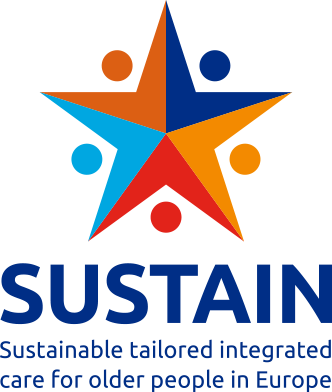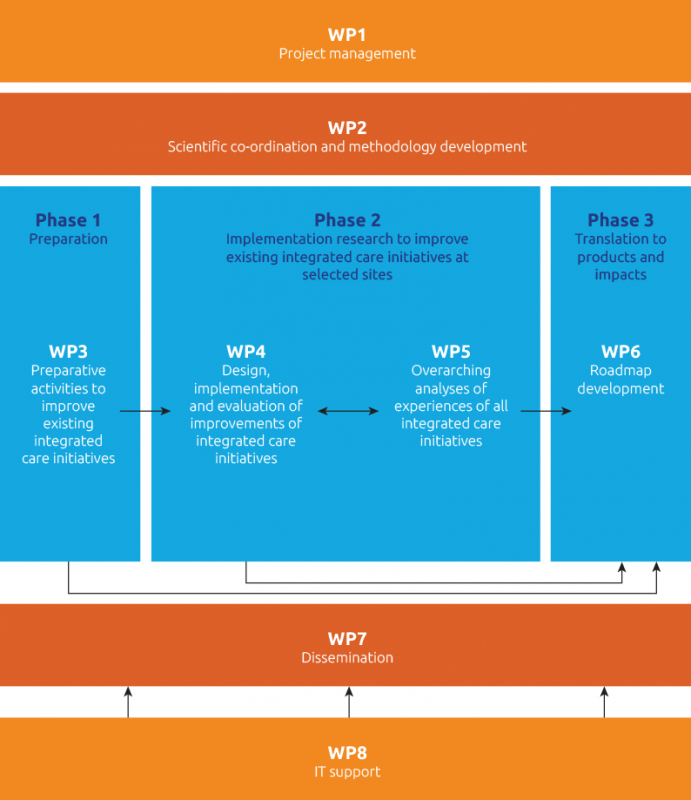The SUSTAIN project aims to improve integrated care for older people living at home with multiple health and social care needs. This page will provide more information about the background and structure of the project.
Background of SUSTAIN
While an increased life expectancy is a positive achievement for our societies, health systems face challenges on both how to increase healthy life years and how to offer quality care and support for those in need. Governments are encouraging ‘ageing in place’ and community-based care, and answer older people’s expectation to live in their home for as long as possible. Integrated care, involving both formal and informal caregivers, is widely acknowledged to be the way forward in care delivery.
Many people grow old in good health and remain active participants in society throughout their lives. However, the prevalence of frailty, (multi)morbidity and disability increases with age and can lead to multiple health and social care needs. These multiple needs often lead to restrictions in social participation, reduced self-reliance and care dependence, which in turn may lead to the utilisation of long-term care and support services.
Sustainable health systems, addressing both health and social care needs, are necessary to optimally support older people, while potentially restricting healthcare expenditures on the longer term. Integrated care is widely acknowledged to be the primary way in which to achieve this vision. In an increasing number of EU Member States, integrated care initiatives are being put in place as new models for safe and efficient, prevention-oriented care to an increasing number of older people. Integrated care initiatives are defined as initiatives that proactively seek to structure and coordinate care for older people in home environments and improve health outcomes while constraining healthcare expenditures. Core elements of integrated care are:
- Proactive assessment of health and social care needs;
- Person-centredness by involving older people and their informal carers in decision-making and planning their care process;
- Involvement of professionals from multiple disciplines (prevention, health care, social care) that collaborate with older people and their informal carers;
- Coordination of care to ensure continuity of delivery of care and support;
- Delivery of multiple interventions: care-related interventions as well as facilitating (e.g. shared ICT systems) interventions.
Evidence of the effectiveness of integrated care is inconclusive. Also there is little knowledge of how to practice integrated care, how to successfully implement it and how to transfer successful initiatives to other regions and health systems.
Project Aim
In response to these challenges, a European multidisciplinary consortium (i.e. SUSTAIN) has been assembled to work towards the following objectives: 1. to improve established integrated care initiatives for older people living at home with multiple health and social care needs, ensuring they are patient-centred, prevention-oriented, efficient, and safe; 2. to ensure that improvements to the integrated care initiatives are applicable and adaptable to other health systems and regions in Europe.
Overall Approach
The SUSTAIN project will last four years and is divided into three interrelated phases. During the first phase (i.e. preparation phase), we will establish working relationships with two existing integrated care initiatives in seven countries (Austria, Estonia, Germany, the Netherlands, Norway, Spain, United Kingdom) that have indicated a motivation to improve current practices. To understand where improvements are necessary, baseline assessments will take place in each of the countries to understand experiences, strengths and weaknesses, and attitudes to change of all stakeholders involved.
In the second phase (i.e. implementation research to improve existing integrated care initiatives) based on the outcomes of the baseline assessments, tailored sets of improvement will be designed and implemented together with stakeholders (i.e. policymakers, commissioners, health insurers, health and social care professionals, older people, informal carers). The implementation of improvements and the overall evaluation of the implementation processes and its outcomes will be guided by a multi-methodological approach, the Evidence Integration Triangle (EIT). Overarching analyses will be undertaken to compare and integrate data from the different sites to robustly identify what works for whom, in what context and with what outcome.


